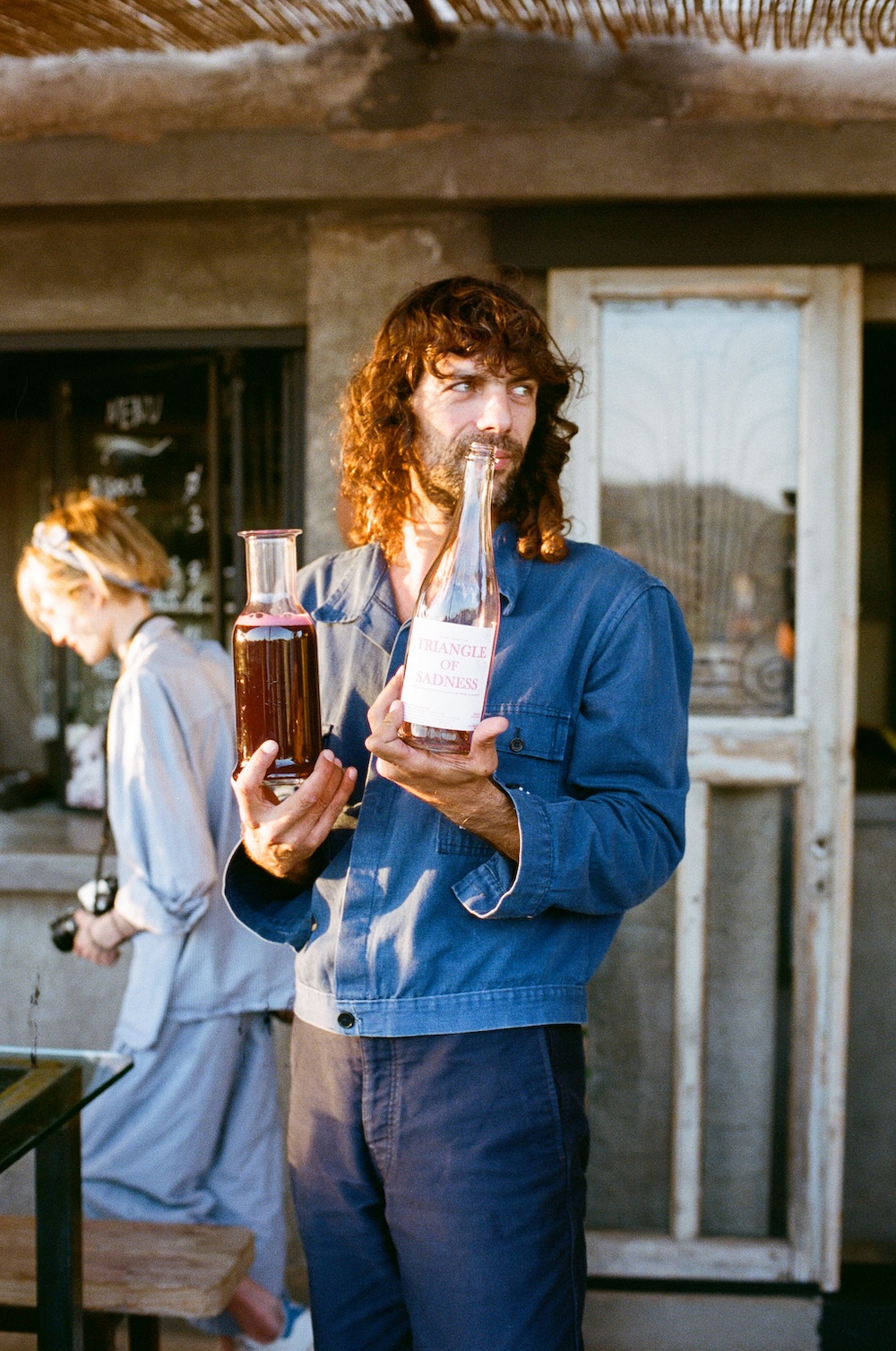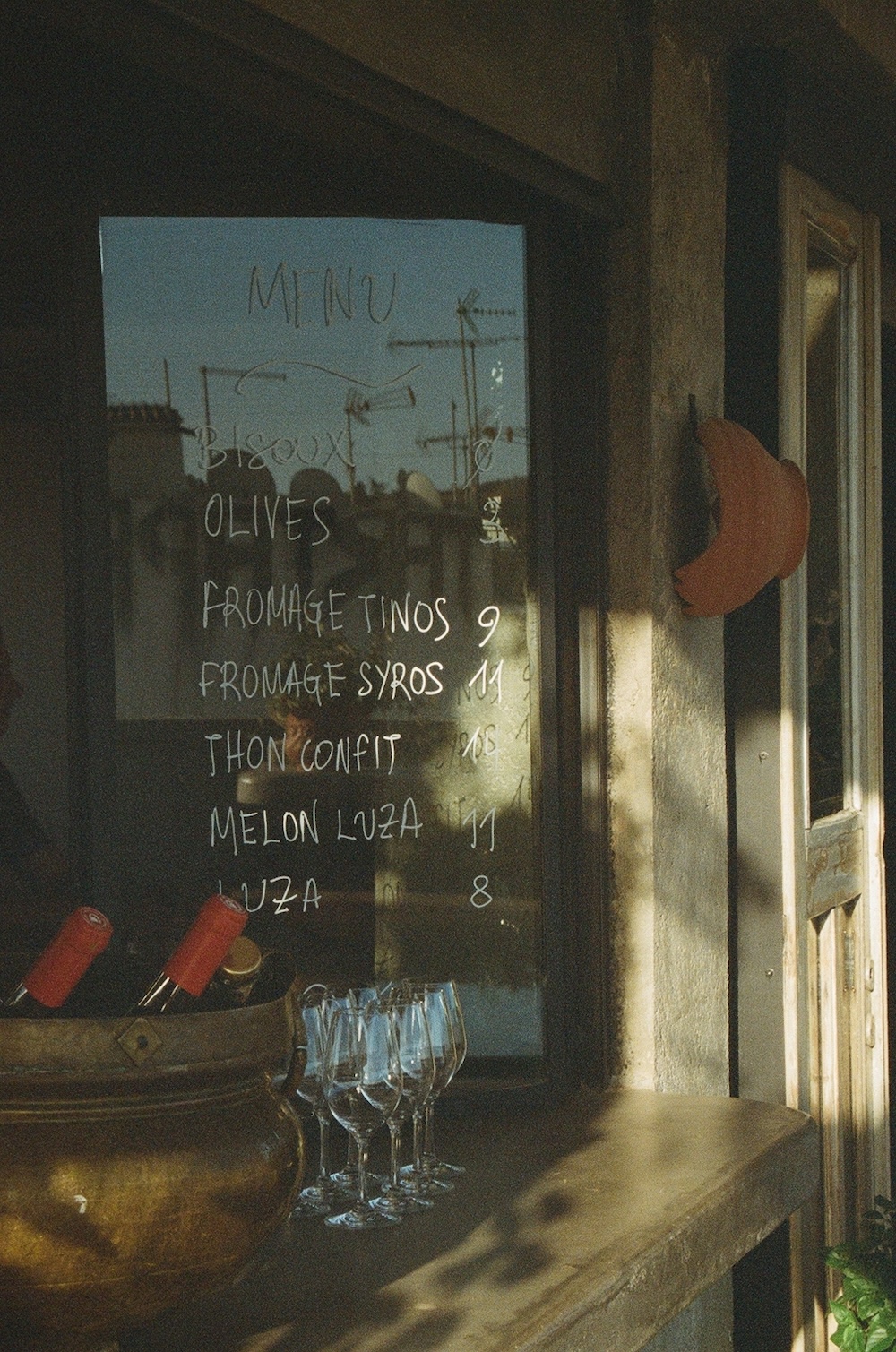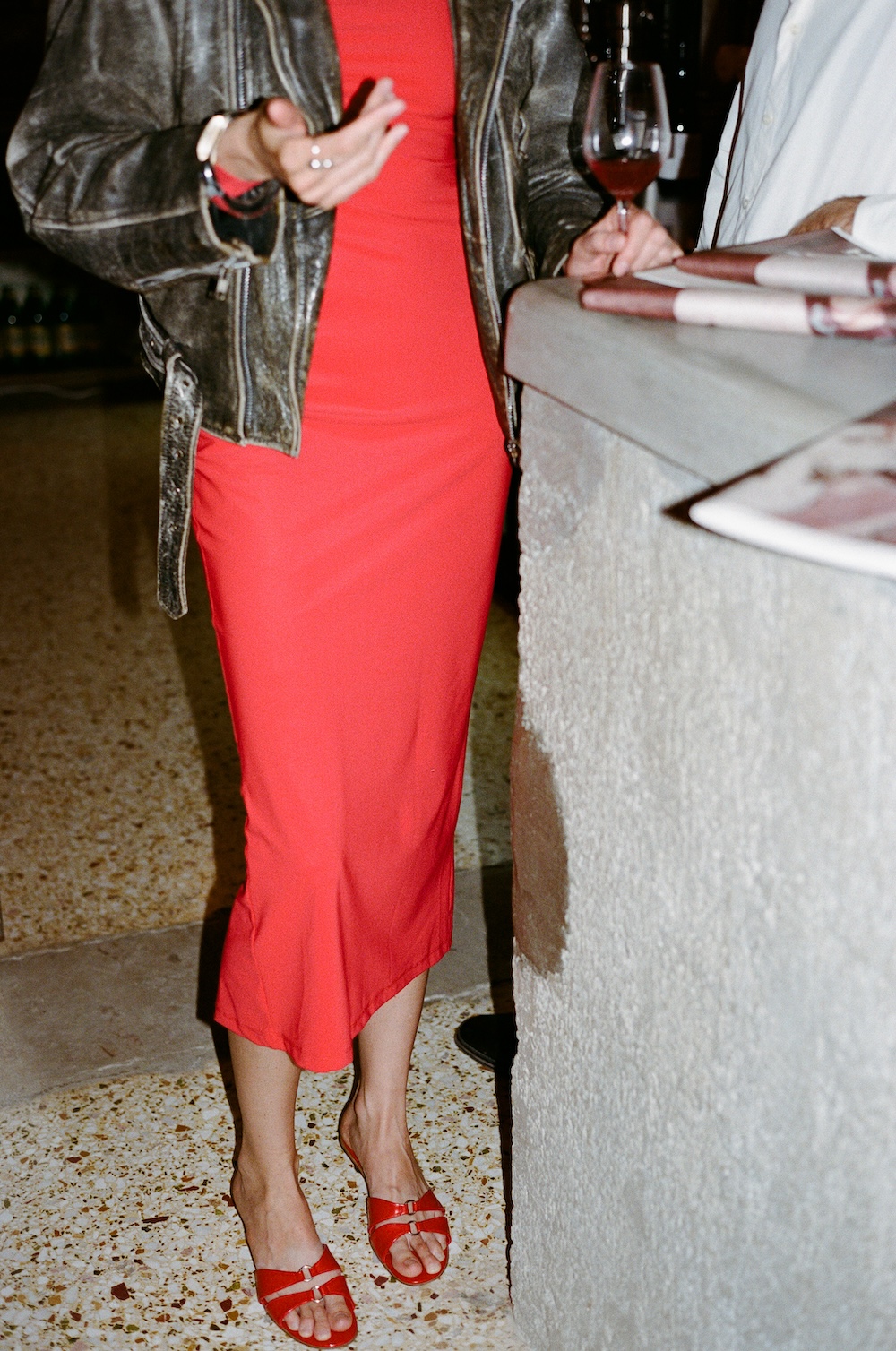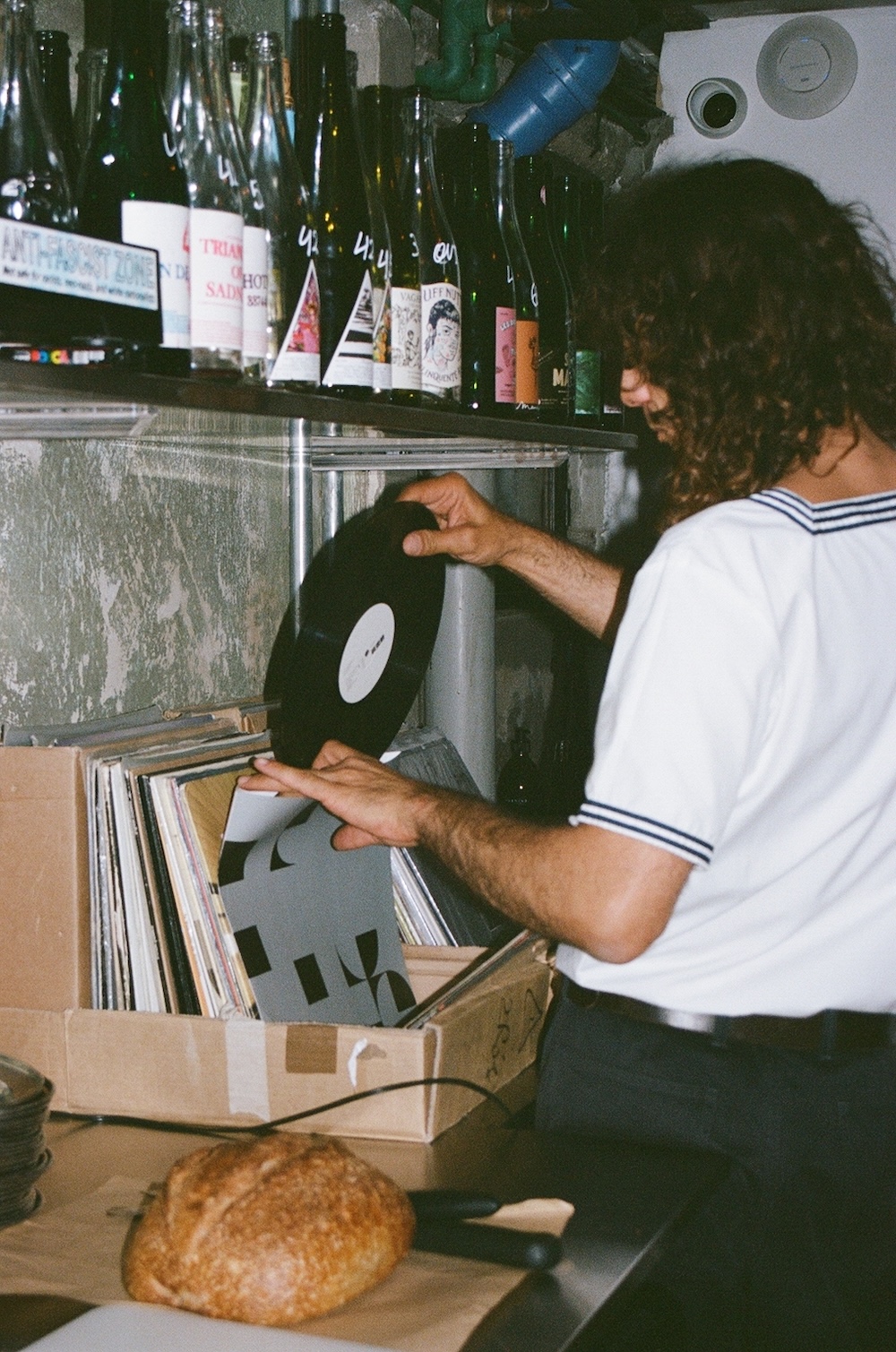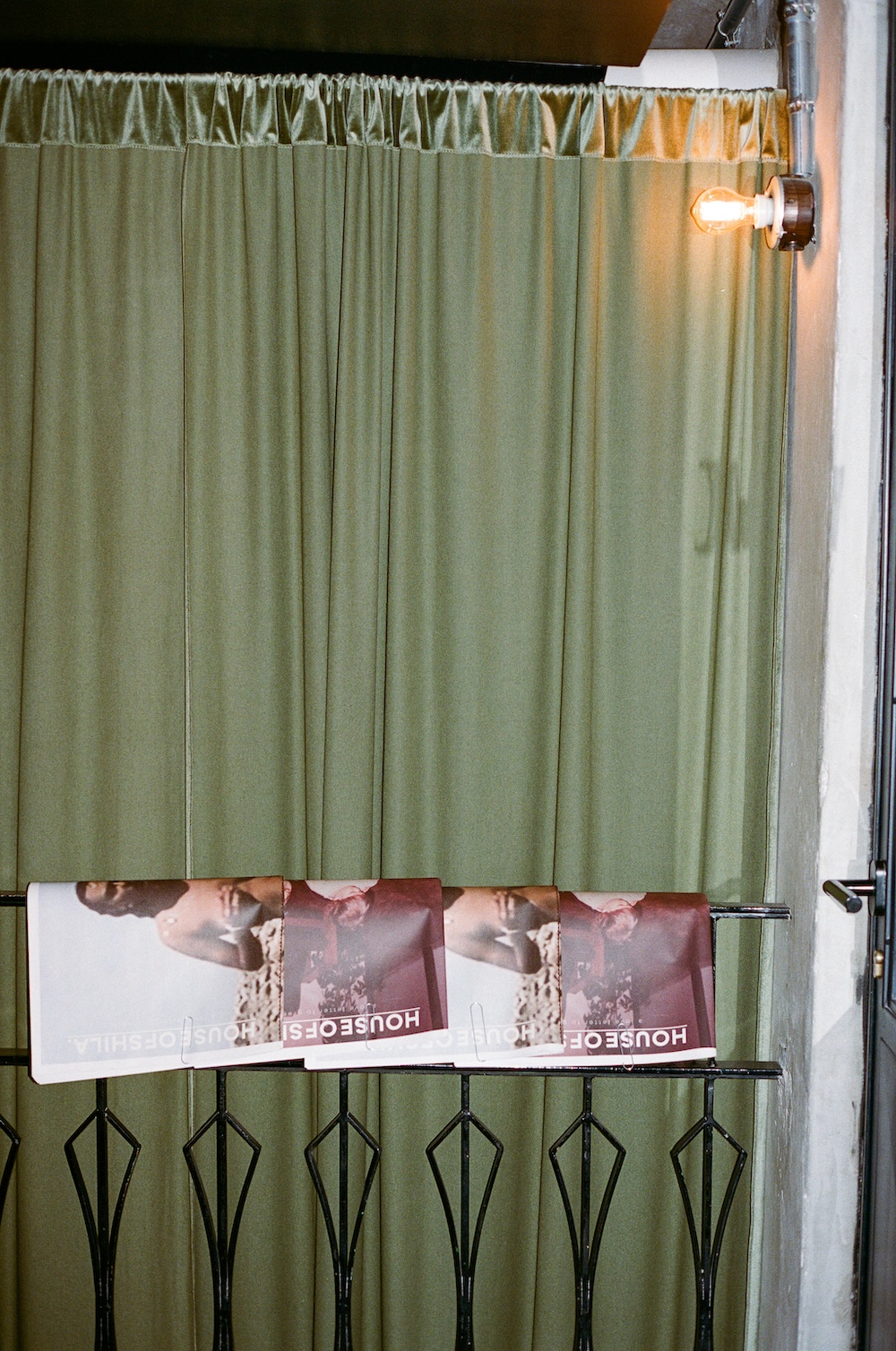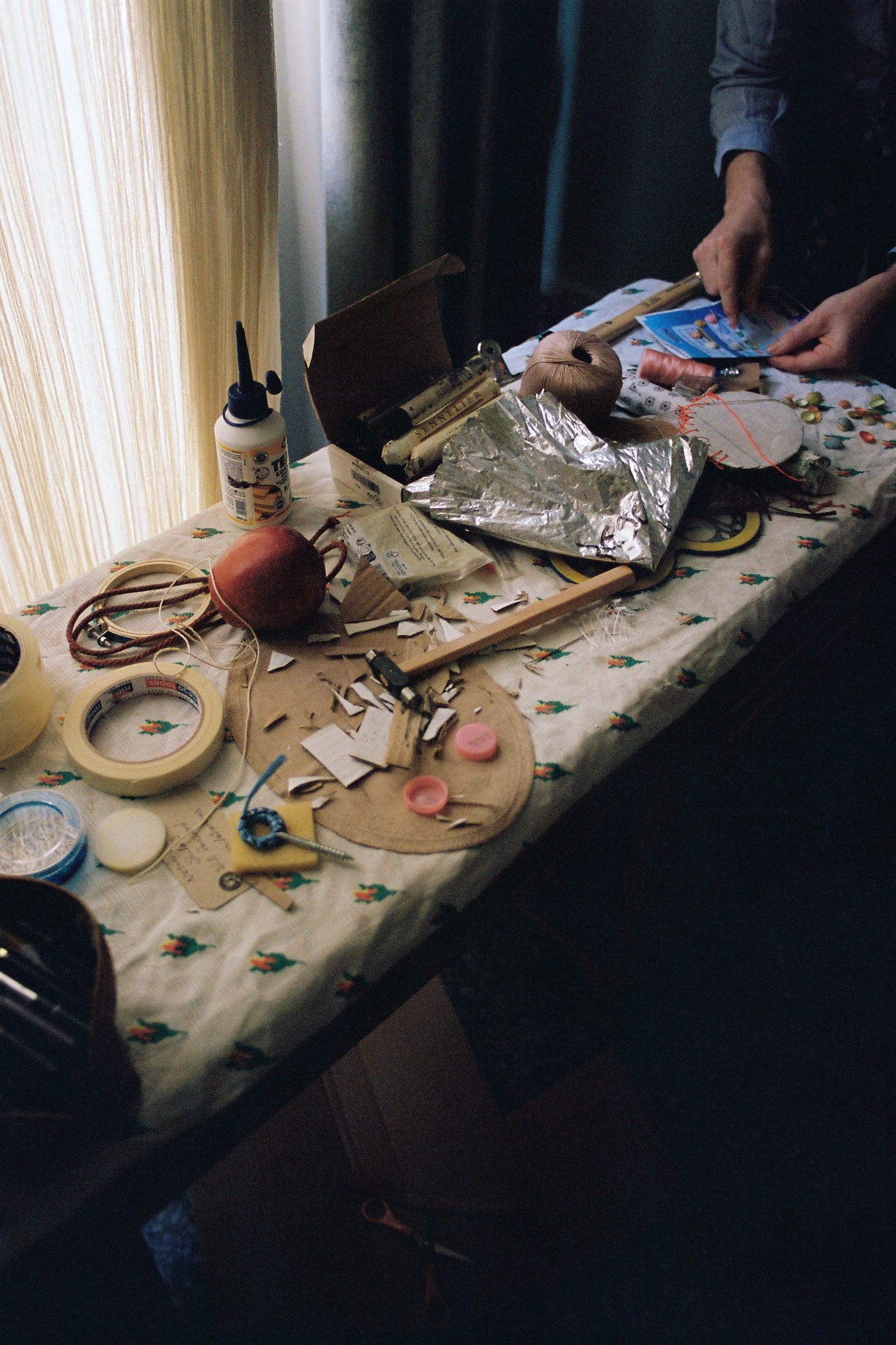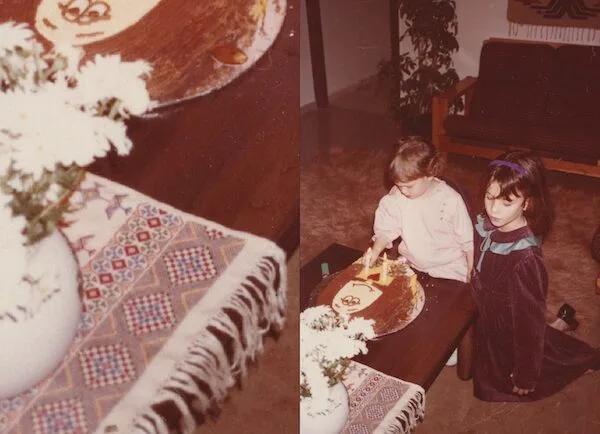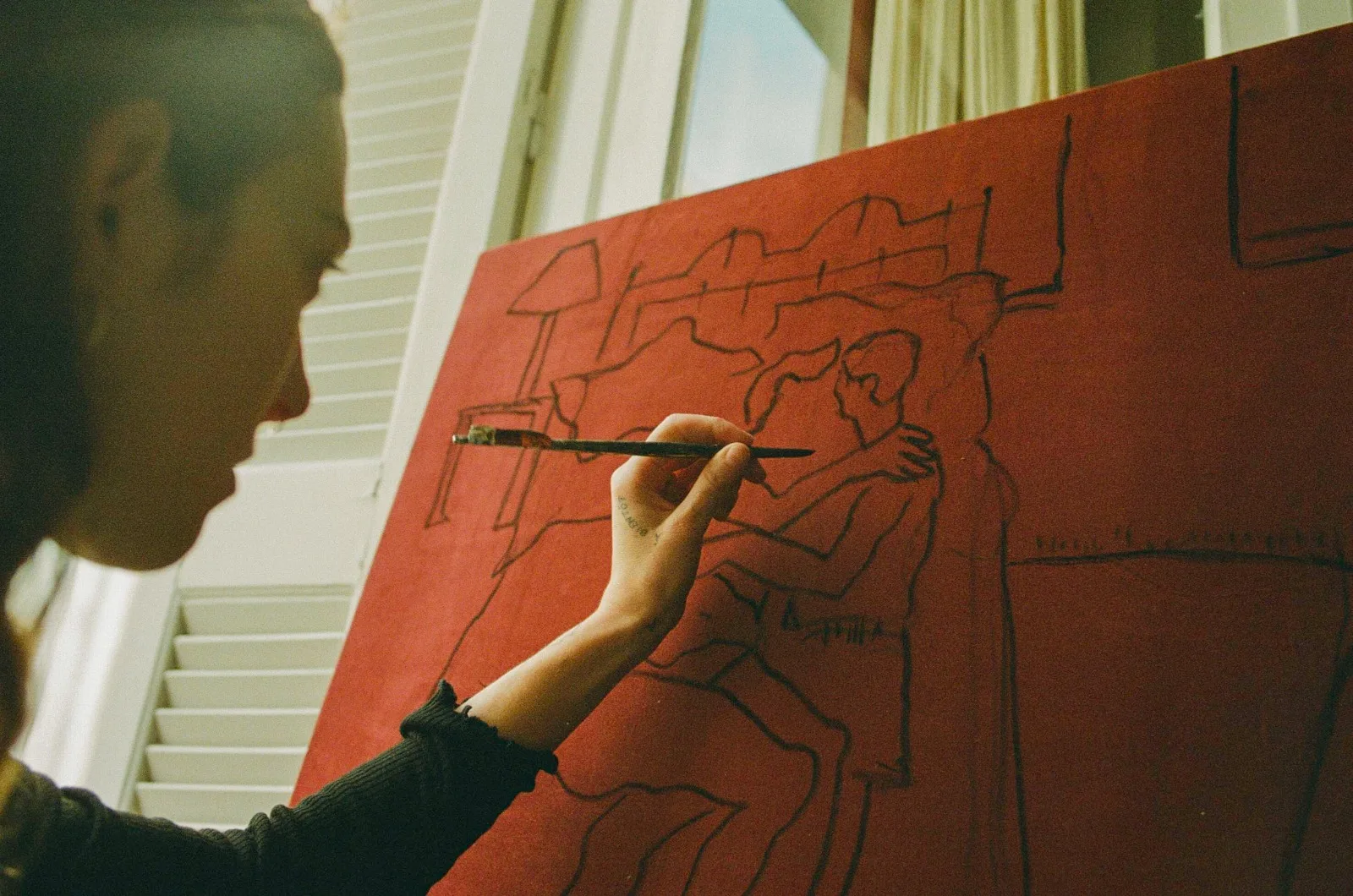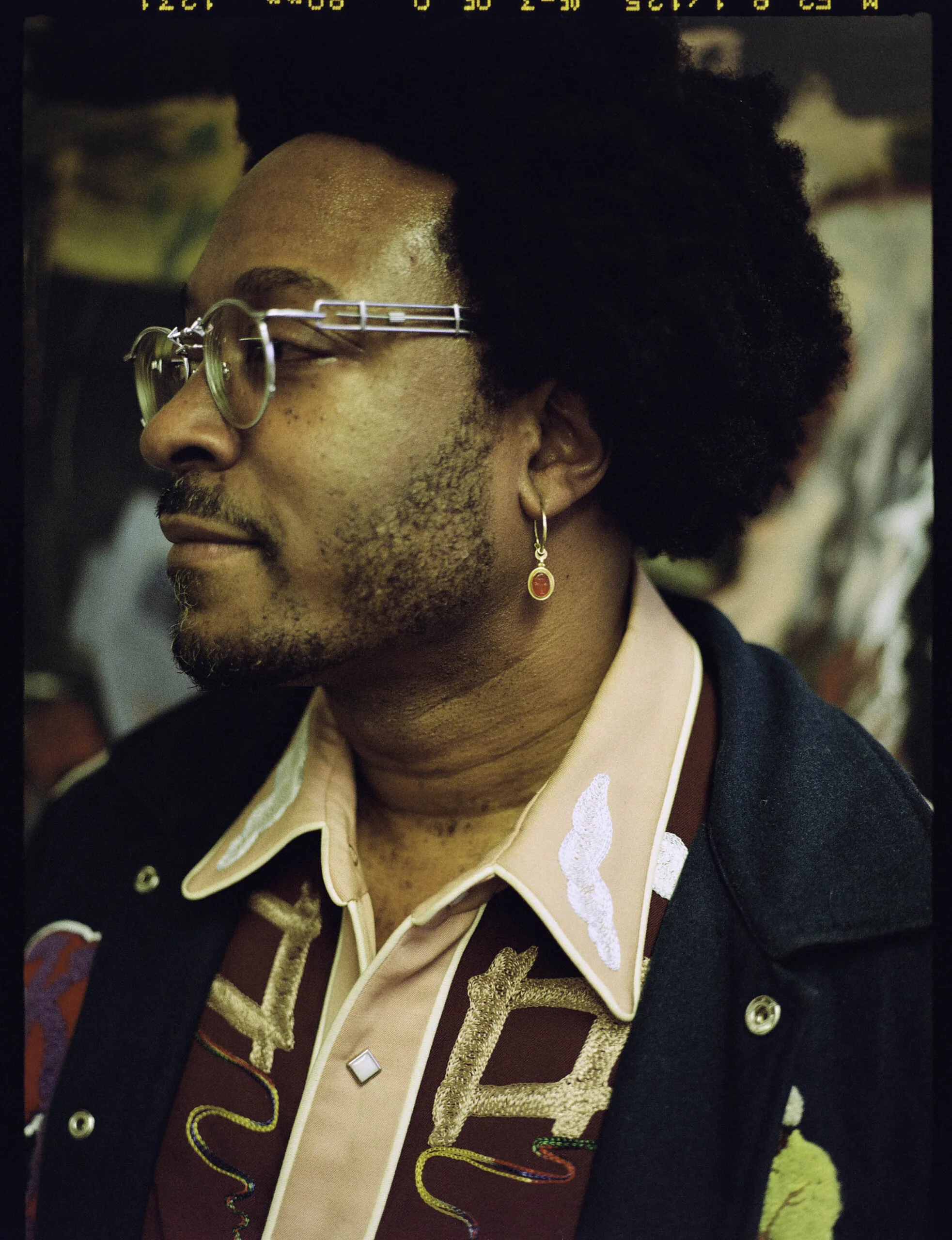feature
Habiba Wine
"Natural wines are what made me become a farmer."
Also known as Habiba Wine, Nikolaos Symeonidis is a natural winemaker, distributor, and part of the new wave of winemakers who consider themselves as much farmers as they do drinkers and producers. During his residency at the Mona rooftop, Habiba stopped by to tell us about how he came to winemaking during the pandemic and the fundamental effect that has had on his personhood as whole.
House Of Shila (HOS): Your background is diverse, from music to fashion to farming, living in Greece, Tunis, Germany, Spain and France. Can you tell me a bit about your upbringing and your early creative life?
Habiba Wine (HW): I grew up in the Balkans. In my early life I studied classical guitar music and went to Andalucía to study flamenco. While there, I became very involved in electronic music and opened a record store in Seville. I began booking electronic music legends to play, those that I had been following for a long time – Derrick May, Kevin Saunderson, Dj Rolando among many others… those with a soulful message and not so European. Jazz, blues and black Afro-American music are what inspired me at that moment. There was a good ‘movement’ happening in my region that lasted until the end of the 90s. Disco, house and techno were movements that created a foreground for several communities such as drag queens, homosexuality, street poetry and avant-garde to shine as popular culture. I was very diverse and very alive during that period.
I moved to Ibiza from there, where I was DJing in big clubs and living a very, let’s say, progressive and bohemian lifestyle. That gave me a lot of Balearic uplifting and healing, which I’ve carried with me for the rest of my life. I guess it stigmatized me, in the good sense of the word.
HOS: What does that mean, to have positively stigmatized you?
HW: Perhaps stigmatized is a very radical way to say it! I see it like being defined – towards how I think, how I see social relationships, how I became open-minded in meeting different people from different countries and learning to adapt. It was where I first experienced a way to make my own way through life.
HOS: And now you’re making wine and distributing it. How did you first become involved in the world of wine and winemaking, and what has that journey been like for you?
HW: After I came back to Greece from years being abroad in Spain, Germany and Tunis, I worked as a reporter for international media and a photographer / fixer for journalists. I did a lot of articles for a variety of publications, print or online, about migration, nature sustainability and wine in different countries.
I visited Serbia, Bulgaria and Greece for Travel & Leisure publications where I got very inspired, almost jealous of how I saw a winemaker in Tinos organizing his life around his life. That was a moment where it came to me – as if in a flash. Up until that point, my life had been about music, and I’d never thought about how deep we can go into investigating the earth. How we could organize a vineyard, and how around the one vineyard you can monetize an operation and plant different types of vegetables and harvest. That came to me so strongly. Like ‘Wow. I would love this.’
It also calls into question the idea of living in a city versus enjoying nature. Or, how much time do you have as a person to develop yourself? Big questions!
So just before Covid time, I decided to join this winery that I worked for and to move to Tinos. The world then became literally isolated around me. Finally, I had time to focus on being with nature. It opened my eyes to how young generations are conditioned to think we must wait until we are pensioners to have this kind of life.
“I knew that I was still young and capable, physically strong enough to be able to cultivate the earth, and wake up early in the morning and live this farmer’s life. I think it was the best thing I’ve ever done.”
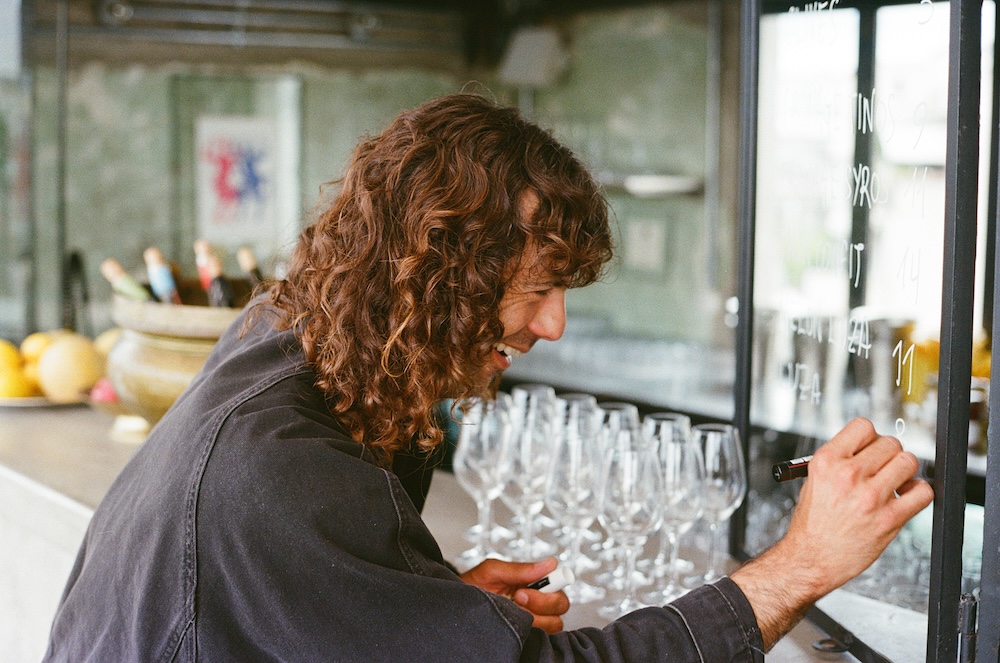
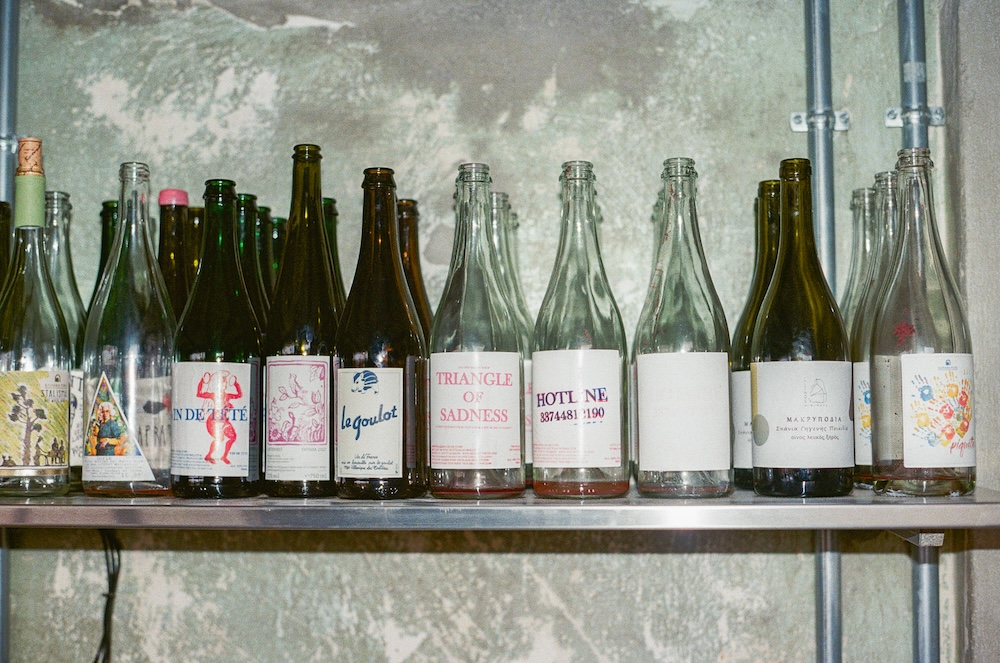
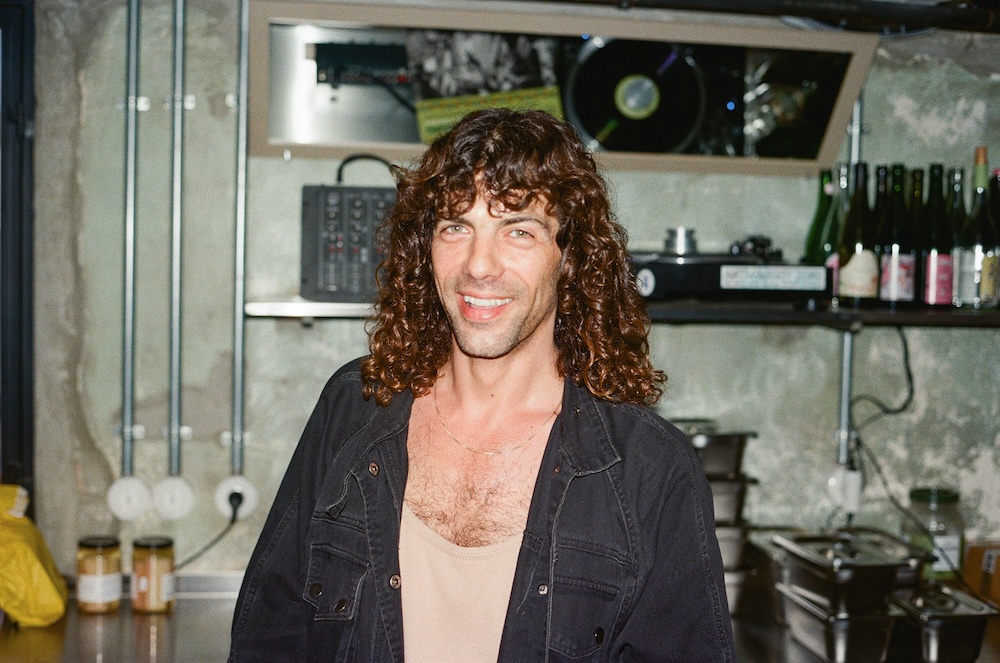
HOS: How did you end up in Paris?
HW: I moved from Tinos to Paris to do fashion because I met a designer that I became friends with. He invited me to model for him in Paris. In the beginning, I was between Tinos and Paris. Paris gave me an opportunity for (re)combining from my previous life that paused during Covid. So, I brought my records, and I brought Greek wines and with this I created the nice vibration that I also felt was missing from the ‘Parisian lifestyle’. Offering something more diverse, more of a cross between a farmer and a punk rather than a sommelier, or chic-chic high-end bistros. The latter are both demanded, but also expected. In Paris I learnt a lot about hospitality, gained certain experiences, though I began to miss my life in the Cyclades.
HOS: And then you opened “Caviste” (wine merchant) in the island of Syros. How did that come about?
Returning from Paris to Greece, I changed islands from Tinos to Syros. This was the winter of 2022, going into 2023. By coincidence, I found this little place in a central market, a grain market. I began flirting with the idea of opening a bar in Syros. It was a low-risk decision. So, I rented the place, went back to Paris to train myself further and then I came back to Syros and opened it last summer.
I hadn’t had the experience of doing a full summer season on this island, but I loved the idea that I could have a bar and build it towards creating a community around drinking natural wine and taking on that challenge of being in a place where, while the lifestyle of drinking does exist – we are not so concerned with what we are drinking.
I wanted to build my business model towards a more cultural approach, providing information on drinking wines without sulfates. This is the concept behind all of what I do. To be an ambassador for people who cultivate here and support small producers. It is also a kind of DIY manifestation towards big industry standards. Having a little place that is manageable and small-scale gives you the opportunity to do that. It’s important because there are not so many locations in Greece that do that. Placing one more location on the map helps Greece become a destination for people who are searching for precisely these kind of natural wine, community-focused initiatives.
HOS: How would you describe your viewpoint as far as natural wines go?
HW: I didn’t drink wine before 2019, until I tried natural wine. Natural wines are what made me become a farmer. It was a breaking point, even towards who I was myself. Being in that kind of situation, I feel the same way now as I did back in the 90s – being a musician, DJ, party organizer and record producer, distributing records and playing gigs live… Now I feel I’m in an agricultural rave! That I’m dancing again and it’s an agricultural dance and I need to be ambassador for it.
I must do pruning, harvesting, I have to bottle, and I have to distribute it. Retail means also becoming part of a larger community, which is very active right now. This is what motivates me. It’s a time where people are concerned about who is making the wine, and what the story behind the winemaker is. There is a growing understanding of how hard is to make natural wines and to support these little initiatives that save the world from a very capitalistic model. These communities are focused on cultivating the earth. That for me – is everything I need.
“Now I feel I’m in an agricultural rave! That I’m dancing again and it’s an agricultural dance and I need to be ambassador for it. “
HOS: And then you opened “Caviste” (wine merchant) in the island of Syros. How did that come about?
Returning from Paris to Greece, I changed islands from Tinos to Syros. This was the winter of 2022, going into 2023. By coincidence, I found this little place in a central market, a grain market. I began flirting with the idea of opening a bar in Syros. It was a low-risk decision. So, I rented the place, went back to Paris to train myself further and then I came back to Syros and opened it last summer.
I hadn’t had the experience of doing a full summer season on this island, but I loved the idea that I could have a bar and build it towards creating a community around drinking natural wine and taking on that challenge of being in a place where, while the lifestyle of drinking does exist – we are not so concerned with what we are drinking.
I wanted to build my business model towards a more cultural approach, providing information on drinking wines without sulfates. This is the concept behind all of what I do. To be an ambassador for people who cultivate here and support small producers. It is also a kind of DIY manifestation towards big industry standards. Having a little place that is manageable and small-scale gives you the opportunity to do that. It’s important because there are not so many locations in Greece that do that. Placing one more location on the map helps Greece become a destination for people who are searching for precisely these kind of natural wine, community-focused initiatives.
HOS: How would you describe your viewpoint as far as natural wines go?
HW: I didn’t drink wine before 2019, until I tried natural wine. Natural wines are what made me become a farmer. It was a breaking point, even towards who I was myself. Being in that kind of situation, I feel the same way now as I did back in the 90s – being a musician, DJ, party organizer and record producer, distributing records and playing gigs live… Now I feel I’m in an agricultural rave! That I’m dancing again and it’s an agricultural dance and I need to be ambassador for it.
I must do pruning, harvesting, I have to bottle, and I have to distribute it. Retail means also becoming part of a larger community, which is very active right now. This is what motivates me. It’s a time where people are concerned about who is making the wine, and what the story behind the winemaker is. There is a growing understanding of how hard is to make natural wines and to support these little initiatives that save the world from a very capitalistic model. These communities are focused on cultivating the earth. That for me – is everything I need.
HOS: And how do you pick the labels you carry as a distributor? What do you think makes a great wine, and is there a recipe for good wine, or is it just subjective?
HW: Well, as far as you don’t put shit in it, and we’re talking about 77 different types of shit that you can put in the wine, we can call it natural. If it’s funky, if the glass of wine wants me to drink it – and because I have no patience to hold a glass of ‘gastronomical wine’ and consume it slowly – I’d like to drink it.
I like wine to move me. To make me feel the energy of it, to give me feeling, and ultimately, to be balanced. When you try something that really blows your mind and you’re engaged, as if it is the first time you hear your favorite band putting out a new record, back in the 90s. Like, I want this primitive feeling to be what I want to drink.
It’s not easy to experience this feeling often even though there are a lot of natural winemakers. However, as soon as let yourself being led by a wine via its taste and scent… suddenly you find yourself inside that glass. It’s you there. You start to get a sense of what you’re looking for. Right now, I am very much down this road, picking and choosing what I will distribute and what I, myself, want to drink. This is how I decide.
HOS: Could you tell us some winemakers you find inspiring?
HW: Jason Ligas. His vineyard is the north of Greece, in Olympus. I went to help him out while he was building his new winery, which is set in an old primary school. He’s a real farmer, a vigneron. He is one of my biggest inspirations of how a winemaker should be and the kind of spirit one should have around it – being noncompetitive, forming an open community, and serving while also having fun doing it. He has shown me how to not get ‘stuck’ in things like earnings, how to empower yourself through it in a way that helps others learn and exchange information. That is what we need right now.
In terms of other wine makers, I am inspired by many young ones, from various countries, who have set up their life around wine, and work in ways that ensure they will save endemic varieties, without needing an industrial approach to it. I love German wines because they are very light. It is not so sunny in Germany, so the wines don’t have high percentages in alcohol. Names that are already in my portfolio include Kleines Gut, Naked Friday, Max Dexheimer, Andi Weigand, MK Wines, Marto, Vin de la Gamba and Kartla Wines. Hungary is very up and coming, Barnga Wines, Kolonia 52, Bence Birtok are three labels that I want to start working with in Greece. I enjoy following what they are doing and continuing to support them how I can. Also, Maurizio Ferraro and Tenuta from Italy and in the future more to come from France, Sweden and Austria.
Makers like this helped me expand how I can position and develop myself in the world of wine in a way that is different than in Greece, which I find a bit conservative and less open towards collaborations or providing space for newcomers to join the winemaking scene.
“When you try something that really blows your mind and you’re engaged, as if it is the first time you hear your favorite band putting out a new record, back in the 90s. Like, I want this primitive feeling to be what I want to drink.”
HOS: Besides distributing, you also make your own wines including one called Hotline 33744812190 that has your actual phone number on the label. Does that number really work and do people call it?
HW: Yes, and I receive a lot of calls! People send messages while they are drinking the wine, or they call to order. I did that as a kind of homage to when you would make a record and you would put your phone number on it. So, when a DJ would play that record in the club and if it got people dancing and was effective, the promoter or booking agent would ask the DJ to see the record and then they could take your number from it to book you. Back then I’d receive phone calls for booking requests like this. When it came to this wine, I had the same thought that I should just put my number on it. It’s the most direct thing you could do if you want to be in touch with your audience, right? I loved the idea that somebody could just call me and say “Hey, I want to make wine” or give a comment or place an order. People love that this is the real number. Probably at some stage I’ll need to put an answering machine so callers can choose to get a bit sexy with it as well. I’m interested in being able to engage with the minds of people while they are drinking. I made the label with a type of ink that washes off with water, so the letters will disappear as it sits in the ice bucket. It adds to this kind of transition. The ephemeral relationship. And so, it’s active. It’s an active relationship.
HOS: That’s very beautiful. I want to ask you about your rooftop takeover over at Mona this summer, serving wines and playing records. What do you hope to express with this residency? What’s the experience you would like people to have when they come by your pop-up?
HW: I want them to feel as though they could be anywhere. I like offering an attempt to transcend rationality through what they are used to or what they might be expecting. Since being at Mona, I often hear feedback from visitors such as “we feel like we are on vacation.” Greeks also experienced it like as if they are somewhere else, outside of Greece, more international. That is the biggest impact I could hope to have.
I also enjoy an element of education during these evenings – ‘teaching’ people how to drink. When someone says, “Let’s go for drinks” and they end up with a gin and tonic… for me, that is a failure. There is no vibration to that. I find it very static, very banal. But if they come by and ask, “What do you have for drinks?” and I say “Just wine. And water.” Often the response begins with, “Just wine?” and I see that as an opening. “Yes wine, and you can have it in any color you want, any temperature you want… Can I curate your night? Can I let you try a chilled red right here in height of summer and combine it with some tuna?” I love this challenge, this diversity. I like creating this access for people, opening an entrance. This is not the norm in Greece. Normally you don’t try the wine before you get a glass. This is the experience I want to create at Mona. Enjoyment, inspiration… I want them to remember these nights. Good wine, good music, good company, being part of a community and a cultural experience – more than being a customer or consumer.
